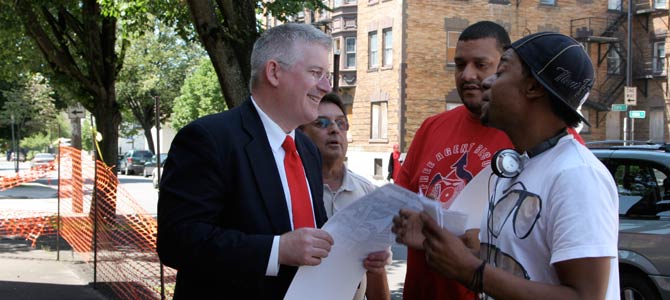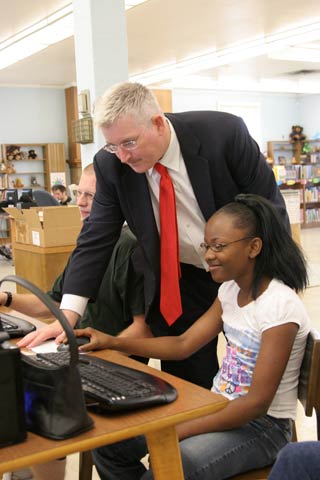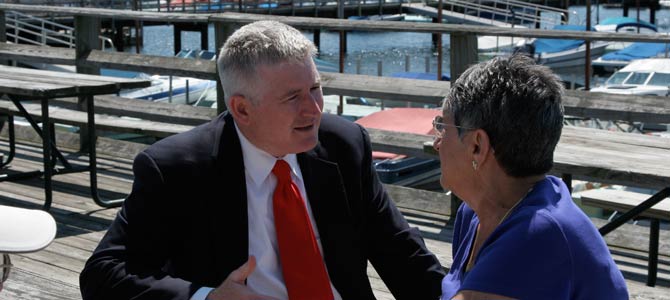Next story: The Bombs Keep Dropping
Mickey Drops His Gloves
by Geoff Kelly & Matthew Quinn

It took a flurry of scandals to get mayoral candidate Mickey Kearns in the news. Now he’s trying to make the most of the moment.
Mickey Kearns is finally getting some headlines. With the primary election less than six weeks away, it’s about time.
After a slow start that’s lasted for months, Kearns has managed to attract some media coverage in recent weeks, largely by dispensing pointed criticism of Mayor Byron Brown and his administration. Kearns has attacked Brown for alleged misuse of federal anti-poverty funds. He’s lit into Brown over troubles at the besieged Buffalo Economic Renaissance Corporation, especially the controversial loans to the failed restaurant One Sunset, which has reportedly attracted the attention of the FBI, as well as audits by City Comptroller Andy SanFilippo and HUD Inspector General Kevin Donahue.
Kearns has made an issue of allegations that the mayor’s office and his department heads have coerced city employees to work on the mayor’s re-election campaign—allegations that have prompted investigations by city and state boards, and now a federal agency concerned with Hatch Act violations. Kearns has suggested that allegations of pay-to-play in the spiking of an East Side housing project ought to be investigated by the feds as well, and has offered the mayor’s gaudy campaign account—well over $1 million and counting—as evidence that individuals and businesses feel compelled to donate to Brown in exchange for favors.
It has taken scandal to land the Kearns campaign in the spotlight, but beggars can’t be choosers: As of mid-July, Kearns had less than $20,000 to spend on his campaign, so he won’t be coming to a TV near you. He’ll have to rely on neighborhood walks, signs, pamphlets, and mailers—plus the mayor’s infrequent missteps and his much more frequent scandals—to lend momentum to his candidacy.
We visited Kearns in his office earlier this week. The full interview, in three parts, is available on AVTV at Artvoice.com. What follows are excerpts from that conversation:
AV: What are your criticisms of the Brown administration’s use of community development block grants?
Kearns: First of all, the Common Council has had concerns about the use of anti-poverty finds for a few years now. We knew it was a new administration, we tried to work in concert and partnership with them. However, they were not cooperative. This year with the change in leadership, with Councilmember Mike LoCurto chairing the Community Development Committee, we’ve really been able to push through some reforms and changes…but we had to ask for subpoenas to get information [from the administration].
You’re talking about an administration that says they’re the most open and transparent administration in city history. They’re open and transparent all right: They don’t want anyone to know anything.
AV: So what specifically is wrong with the way they’ve used HUD money?
Kearns: You cannot use anti-poverty funds for Blackberries. You cannot use anti-poverty funds for travel. You cannot use anti-poverty funds to double-dip and pay people who are making incredible salaries in the third-poorest city in the country an addition $15,000 or $20,000 thousand as political paybacks. You just can’t do that with anti-poverty funds.
The local HUD office provided us with a monitoring report; they oversee those funds. The Common Council requested some basic information—why this report was commenced, can we receive some technical assistance on those 19 findings and two concerns dealing with compliance. We did not get an answer, so I decided to draft a letter to the US Inspector General for the Department of Housing and Urban Development, Kevin Donahue. Their mission statement is this: It “promotes the integrity, efficiency, and effectiveness of HUD programs,” and “operates to assist the department in meeting its missions.” Also, it “detects and prevents waste, fraud and abuse.” Additionally, it “seeks administrative sanctions and civil recoveries.”
That’s very important, because if the City of Buffalo is going to have to pay back millions and millions of dollars to HUD, and there are fines levied, it’s going to come out of the taxpayers’ pocket.

AV: These criticisms are drawing attention to your campaign, which has had something of a slow start.
Kearns: I don’t believe these are criticisms of the administration. I believe these are facts. We are just letting the public know what is going on with their funds. They’re the boss, and this is something that needs to be out in the open.
AV: You’ve also attacked the Brown administration for allegedly compelling city workers to donate time and money to the mayor’s campaign—an allegation that gained credence when the Buffalo News published an email from a department head asking her employees to “volunteer” for Brown.
Kearns: We all understand you can’t take the politics out of politics. But there are certain rules and restrictions with the state, with the Hatch Act, with ethics. In the City Charter, it states that you cannot use your position to force or coerce someone to do political work. The civil service system was put in place for a reason. The institutional knowledge is very important to keep the wheels of government moving. Mayors come and go, Common Council members come and go, but civil service workers, they’re there to bring continuity to the process. Their institutional knowledge helps us to get thing done, regardless of who the mayor is.
When you have commissioner who did not ask but ordered, mandated, required that you go and participate in a certain number of hours of political work—over 10 hours per week—and that order comes with a follow-up, a command, that we’ll be contacting you if we don’t hear from you? That’s wrong. Again, that’s not me talking, that’s a fact, that’s the law. These investigations are born of the incompetency of this administration.
People have been complaining, and I’ve been complaining, and finally we have the smoking gun, which is [Community Services Commissioner Tanya Perrin-Johnson’s] email. The city’s Board of Ethic is reviewing this right now, the State Commission on Public Integrity is reviewing this now, and now we find out that the feds are involved, too.
When I’m mayor, I’m not going to ask for [donations from city workers]. We’re going to have a cap on that. Having commissioners go out and carry petitions? That’s wrong. Commissioners should be there to deliver service, not petitions. We’ve politicized the mayor’s office too much. City Hall needs a cleansing. We need to throw these people out and start fresh.
AV: So that’s three investigations on compulsory political work. Throw in at least one investigation by the FBI, audits by the City Comptroller and the HUD Inspector General—that’s a lot of ammunition handed to you the month before the Democratic primary.
Kearns: And remember, we have pay-to-play here…people have indicated to me that this is the most vindictive administration they’ve ever seen. People are afraid. They’ve conveyed this to me, they’ve conveyed this to the Buffalo News. There is a pay-to-play mentality, which I’m going to end when I’m the mayor.
I think there’s an abuse of professional services discretion, our hiring of contracts, of lawyers and architects. [Former Corporation Counsel] Alisa Lukasiewicz and I were working in concert on this, and I give her a lot of credit for talking about initiating RFPs for legal work. During the Seneca casino talks dealing with Fulton Street, the fees were outrageous, and I asked why we couldn’t do things like requests for proposals for legal work. In addition to that, I asked, if a legal or architectural firm was getting the bulk of the city’s work, why couldn’t they give us a government rate?
As mayor, two things I’m going to do. One, I want people to sharpen their pencils to give us the best possible rate—not sharpen their pens to write me a check. Two, I’m going to fully disclose every vendor who gives to my campaign. I don’t think that in the third-poorest city in the country, that mayor needs almost $1.5 million to run against a challenger, unless that person is seeking higher office or using this as a stepping stone, which I do believe this current mayor is.
AV: Even with all this ammunition, your candidacy is a long shot. The mayor has more money to spend, a strong get-out-the-vote operation, lots of endorsements. How do you intend to combat those strengths?
Kearns: [Laughing] If the mayor would like to donate a couple thousand dollars to our campaign, we’ll take it.
AV: Seriously, though, how do you reach voters and get them to the polls?
Kearns: We’ve been utilizing a lot of free media, plus there’s my position. I’ve been using the bully pulpit of my position. I’ve just been doing my job—whether I was running for mayor or not, I’d still be on a lot of these issues.
I can’t compete against millions of dollars. But you know what? Why can’t the third-poorest city in the country, the underdog city, have an underdog mayor? Why can’t you choose someone who is representative of you, who doesn’t owe a million favors for a million dollars?

The Kearns Platform
Kearns says his platform comprises six planks: crime, housing, accessibility and accountability, neighborhood development and revitalization, growing Buffalo, and education. Here’s the makeup of some of those planks:
Crime
• Kearns says he’d hire more cops, funding the positions by saving through efficiencies.
• He says he’d eliminate the six politically appointed police chiefs, positions created by the Masiello administration, and return their duties to police inspectors. The money that paid for that line of management will be used to fund community police officers working out of neighborhood quality-of-life centers.
• “I’ve never seen a camera put the cuffs on anyone. We need to make sure we have pro-active, aggressive policing. We are at an all-time high when it comes to murder and violent crime in this city. Gun buybacks are good, but they’re not the answer.”
Housing
• Kearns says he’d have inspectors and city planners working out of neighborhood quality-of-life centers.
• He’d seek strategic plans not just for the whole city but for individual neighborhoods, using feedback from community groups and housing experts.
• He’d expand grant programs along the lines of his South Buffalo roofing program, which provided $1,000 grants for roof replacements to qualified homeowners.
• Rather than hire two deputy mayors, as Brown has done, he’d hire a housing czar to establish and execute a housing policy for the city.
• He’d do a full assessment of every house in the city, just like the assessment done of city trees after the October 2006 storm.
• He’d direct more anti-poverty dollars to brick-and-mortar projects, minimizing their use for salaries and other personnel costs.
• He’d initiate CitiCorps, a city-focused version of AmeriCorps that will provide a pool of young labor and talent for community projects, including housing issues, at little cost. The first volunteer is already working with Common Council President David Franczyk.
• He’d create a single block grant director to oversee the use of block grant money and to communicate with HUD.
• “Council President Dave Franczyk said it best: It’s like a slow Katrina. If we don’t solve our housing crisis, we’re going to have more crime, more blight, and a continuing lack of reinvestment in our neighborhoods.”
Economic Development
• He’d take advantage of the waterfront, especially the Outer Harbor, by taking down the Skyway and the elevated portion of Route 5, opening up the Outer Harbor to development.
• He’d reform the permit process so it’s quick and predictable.
• He’d concentrate on assisting small businesses with just a few employees instead of dedicating resources to silver bullet projects that promise lots of jobs that rarely materialize.
• “We may not hit a home run every time, but a couple singles and a couple doubles and we’ll make progress.”
blog comments powered by Disqus|
Issue Navigation> Issue Index > v8n32 (week of Thursday, August 6, 2009) > Mickey Drops His Gloves This Week's Issue • Artvoice Daily • Artvoice TV • Events Calendar • Classifieds |









 Current Issue
Current Issue